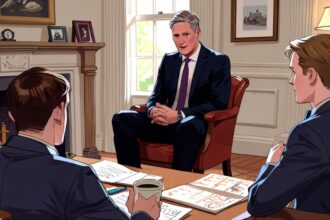Ukrainian President Volodymyr Zelensky cautions Europe and NATO of the domino effect if Ukraine falls to Russia, amidst heightened global diplomatic efforts and defense concerns.
Ukrainian President Volodymyr Zelensky recently warned Europe and NATO of the consequences if Ukraine falls to Russian forces, suggesting that Russian President Vladimir Putin’s ambitions could threaten other European nations. This statement comes amid heightened tensions due to Russia’s aggressive stance towards countries like Moldova, Poland, and the Baltic States. Zelensky’s concerns highlight the risk of a broader conflict involving NATO, especially with the ongoing support Ukraine receives from Western military to counter the Russian forces.
In related diplomatic efforts, Ukraine’s Foreign Minister, Dmytro Kuleba, embarked on a significant two-day visit to New Delhi, India. This visit aims at enhancing ties and discussing President Zelensky’s ‘peace formula’ with Indian Foreign Minister Subrahmanyam Jaishankar. India, under Prime Minister Narendra Modi, has expressed support for peace in the region, balancing its diplomatic relationships between Ukraine and Russia. The talks are part of India’s broader strategy to mediate in the Ukraine-Russia conflict, showcasing its growing role in global diplomatic efforts.
Romania, a NATO member, has reported the discovery of drone fragments near its border with Ukraine, amidst Russian missile and drone attacks on Ukrainian territories. This incident raises concerns over the conflict’s spillover into NATO territories. Financially, Ukraine secured a $1.5 billion tranche from a World Bank program, supported by Britain and Japan, aiding its budget and social spending in the war effort. Militarily, Ukraine reported downing 84 aerial targets during a recent Russian offensive, signaling a reduction in the required mobilization thanks to a reassessment of resources.
Meanwhile, a substantial Russian attack on Ukraine targeted the country’s energy infrastructure across 10 regions with drones and missiles. Despite Ukraine’s air defenses downing many of the attacks, the damage to facilities and injuries to civilians, including a five-year-old girl, were reported. Neighboring Poland and Romania responded to these escalations, indicating the regional security implications of the ongoing conflict.
In further diplomatic engagements, Ukraine and India held talks to strengthen their bilateral relations amidst the ongoing conflict. Kuleba’s visit to India and discussions with Jaishankar underscore an effort to leverage India’s historical ties with Russia for peace initiatives in Ukraine. India’s evolving stance reflects its ambition to be a key player in global security and development, indicating a strategic pivot in its international relations policy amidst the conflict.













